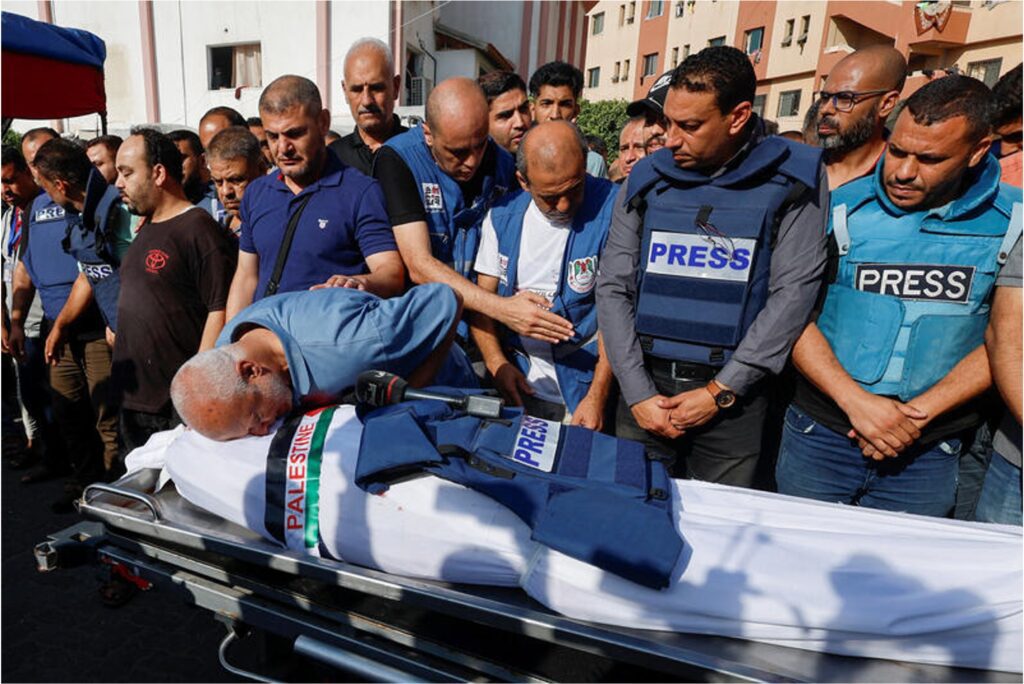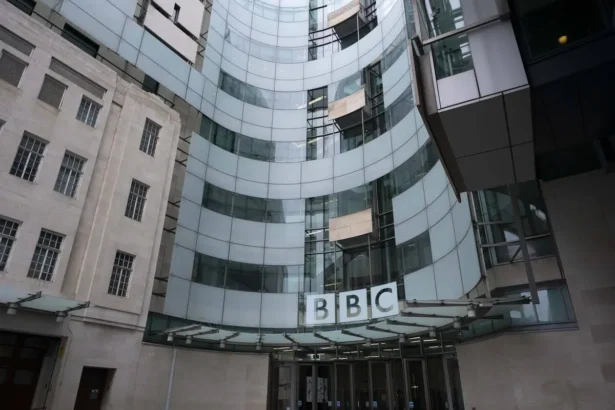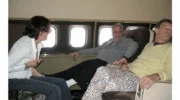A letter signed by more than 230 members of the media industry, including 101 anonymous BBC staff, criticized the BBC for failing its own editorial standards by lacking “consistently fair and accurate evidence-based journalism in its coverage of Gaza”
Written by Athena Stayrou, Reposted from The Independent
More than 100 BBC employees are accusing the corporation of providing favorable coverage toward Israel and are calling on the broadcaster to “recommit to fairness, accuracy, and impartiality” over its reporting on Gaza.
In a letter sent to Tim Davie, signed by more than 230 members of the media industry, including 101 anonymous BBC staff, the corporation is criticized for failing its own editorial standards by lacking “consistently fair and accurate evidence-based journalism in its coverage of Gaza”.
Seen exclusively by The Independent, the letter, which has also been signed by Sayeeda Warsi and the actor Juliet Stevenson, calls on the BBC to report “without fear or favor” and to “recommit to the highest editorial standards – with emphasis on fairness, accuracy, and due impartiality”.
The letter also calls on the broadcaster to implement a series of editorial commitments including “reiterating that Israel does not give external journalists access to Gaza; making it clear when there is insufficient evidence to back up Israeli claims; making clear where Israel is the perpetrator in article headlines; including regular historical context predating October 2023; and robustly challenging Israeli government and military representatives in all interviews”.
The BBC has denied these claims, insisting it “strives to live up to our responsibility to deliver the most trusted and impartial news”.
A spokesperson said: “When we make mistakes or have made changes to the way we report, we are transparent. We are also very clear with our audiences on the limitations put on our reporting – including the lack of access into Gaza and restricted access to parts of Lebanon, and our continued efforts to get reporters into those areas.”
Other signatories on the list include the historian William Dalrymple, Dr Catherine Happer, a senior lecturer in sociology and director of media at the University of Glasgow, Rizwana Hamid, the director at the Centre for Media Monitoring, and the broadcaster John Nicolson.
It is not the first time the BBC has been criticized for bias during the Gaza war. In September, the BBC refuted claims that it had breached its own guidelines more than 1,500 times following a controversial report alleging that some BBC correspondents had excused or downplayed Hamas’s activities. A spokesperson for the BBC said at the time that it would “carefully consider” the research but denied claims of bias.
Nonetheless, the signatories of the letter insist the bias favors Israel. A current staff member who has signed the letter told The Independent that some of their colleagues have left the corporation over its coverage.
“I have never, in my entire career, witnessed such low levels of staff confidence,” they said. “I have colleagues who have left the BBC in recent months because they just don’t believe our reporting on Israel and Palestine is honest. So many of us feel paralyzed by the levels of fear.”
Another said they were “losing faith in the organization [they] work for”, having seen a “huge disparity” in the BBC’s approach towards Israel. They added: “I genuinely care about the future of the BBC, and every day I see that we are losing the trust of audiences across the world.
“People are going elsewhere to find the reality of what is happening because we are simply not giving it to them.”
Examples given by staff include “dehumanizing and misleading headlines”, including the one given to an article about a six-year-old girl who was shot to death by the Israeli military in Gaza in January 2024.

Speaking about the headline, “Hind Rajab, 6, found dead in Gaza days after phone calls for help”, a signatory of the letter said: “This was not an act of God. The perpetrator, Israel, should have been in the headline, and it should have been clear that she was killed.”
Another colleague said: “Palestinians are always treated as an unreliable source and we constantly give Israel’s version of events primacy despite the IDF’s well-documented track record of lying.
“We often seem to prefer to leave Israel out of the headline if at all possible or cast doubt on who could be to blame for airstrikes. The verification level expected for anything related to Gaza hugely outweighs what is the norm for other countries.”
Other concerns raised by staff include omissions of coverage, such as the failure to live broadcast South Africa’s genocide case against Israel at the International Court of Justice on 11 January but choosing to live broadcast Israel’s defense the following day.
Of the 237 signatories, 72 have signed publicly, including former UK foreign minister and broadcaster Baroness Warsi and Emma actor Juliet Stevenson, as well as dozens of academics.
The letter, while focusing on the BBC, also highlights shortcomings in other media outlets including ITV and Sky.
The BBC said in response: “This conflict is one of the most polarizing stories to report on, and we know people feel very strongly about how this is being reported, not only on the BBC but across all media. The BBC holds itself to very high standards, and we strive to live up to our responsibility to deliver the most trusted and impartial news – weighing and measuring the words we use, verifying facts, and seeking a wide range of interviews and expert opinions.”
While acknowledging that the “BBC does not and cannot reflect any single world view”, a spokesperson insisted that it receives an almost equal measure of complaints asserting bias towards Israel as bias against it.
They added: “This does not mean we assume we are doing something right, and we continue to listen to all criticism – from inside and outside the BBC – and reflect on what we can do better.”
Athena Stavrou is a general reporter at The Independent. Read more of her work here.
RELATED:
- Media bias in Western coverage of Israel’s war on Gaza
- U.S. Media’s Doublespeak: Israelis Live in “Densely Populated Areas,” Palestinians Are “Human Shields”
- Western media continue to withhold the truth about Israel and Gaza – 4 stories
- U.S. media downplays and ignores ICJ ruling declaring Israeli occupation illegal
- Nuseirat massacre: Slaughtered Palestinians do not exist for West’s media





